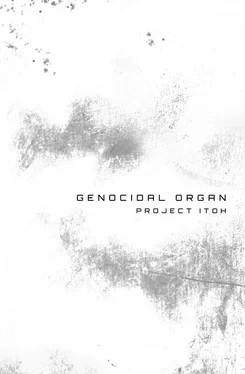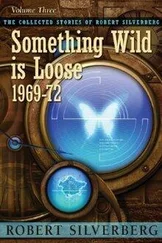Project Itoh - Genocidal Organ
Здесь есть возможность читать онлайн «Project Itoh - Genocidal Organ» весь текст электронной книги совершенно бесплатно (целиком полную версию без сокращений). В некоторых случаях можно слушать аудио, скачать через торрент в формате fb2 и присутствует краткое содержание. Год выпуска: 2012, ISBN: 2012, Издательство: Haikasoru/VIZ Media, Жанр: Старинная литература, на английском языке. Описание произведения, (предисловие) а так же отзывы посетителей доступны на портале библиотеки ЛибКат.
- Название:Genocidal Organ
- Автор:
- Издательство:Haikasoru/VIZ Media
- Жанр:
- Год:2012
- ISBN:9781421550886
- Рейтинг книги:4 / 5. Голосов: 1
-
Избранное:Добавить в избранное
- Отзывы:
-
Ваша оценка:
- 80
- 1
- 2
- 3
- 4
- 5
Genocidal Organ: краткое содержание, описание и аннотация
Предлагаем к чтению аннотацию, описание, краткое содержание или предисловие (зависит от того, что написал сам автор книги «Genocidal Organ»). Если вы не нашли необходимую информацию о книге — напишите в комментариях, мы постараемся отыскать её.
Genocidal Organ — читать онлайн бесплатно полную книгу (весь текст) целиком
Ниже представлен текст книги, разбитый по страницам. Система сохранения места последней прочитанной страницы, позволяет с удобством читать онлайн бесплатно книгу «Genocidal Organ», без необходимости каждый раз заново искать на чём Вы остановились. Поставьте закладку, и сможете в любой момент перейти на страницу, на которой закончили чтение.
Интервал:
Закладка:
“John’s waiting for you outside, Lucia.” Lucius pointed Lucia toward the exit. Gently but firmly. Time to go.
Lucia glanced toward the exit before turning her gaze back on me. Was she hesitating? Or condemning me? I was so overwhelmed by guilt that I could no longer tell.
An eternity of agony. It was agony to be looked at by Lucia. Her piercing gaze was unbearable. And yet I didn’t want her to go. I wanted her to stay here.
Your ex is a mass murderer. He’s responsible for more deaths than Stalin. I could have told her that. Shouted it out. Except … except—what right did I have to tell her?
“Lucius … don’t let this man die,” Lucia said.
“Lucia, please. I abhor killing.”
Upon hearing what she needed to hear, Lucia turned around and left the club. I listened to her fading footfalls, my insides churning in a cocktail of regret.
The door closed, and the footsteps faded away completely. Lucius and his henchmen stared down at the abyss, at me, the wretched insect.
No one was speaking anymore. They were weighed down by the burden of what was about to happen, what had to happen. They were gritting their teeth. Doing what they had to do for the sake of freedom. To resist the evil will of those who insisted on watching them.
That was why I now had to die.
“I thought you abhorred killing,” I said.
“Indeed, I do.” Lucius actually did look genuinely sorry for what he was about to do. Just as, I’m sure, Hitler once did, and Stalin. Or, indeed, the ex-brigadier general that I had dispatched once upon a time, or our captive Ahmed from Somalia. Lucius might have felt guilty, but his guilt was of no value. Just as my guilt toward Lucia was of no value.
“That’s why it pains me so much to have to do this,” he said.
It was at that moment that a mosquito buzzed in front of me. It was as if I were in a dream—a final mirage I was seeing in the face of death. The mosquito hovered and settled on my middle finger.
The middle finger I had dabbed with pheromones earlier.
Lucius noticed the mosquito.
“You … a Tracer Dog—”
I lifted my bound hands to cover my right ear, using my shoulder to cover the left. I opened my mouth wide and braced myself.
The world roared, and the south wall exploded. A huge shock wave slammed through the room. Fragments of the wall and dust and debris filled the room, blinding us all. Lucius and his group were instantaneously immobilized. Many of them would have ruptured eardrums. I had managed to block my ears and open my mouth in time, just about, and even so my head was ringing.
All Special Operations I Detachment personnel had indoor assault training drilled into us during basic training at Killing House. During the training we had to take turns in shifts: who would be the assailants, who would be the targets, and who would be the hostages. The one thing I took away from my turn as a hostage was that when Special Forces attack, you had better eat dirt if you want to survive. Hit the ground and wait until it’s all over. Stay standing and you had no right to complain if your putative rescuers shot you dead. Your average Special Forces man was a crack headshot.
Because of this, I had no idea who on my team did what and who killed who. If ever there was a situation where curiosity would have killed the cat, it was this.
The entire assault operation took less than three minutes. It was a fairly small club after all. The dust never even had a chance to settle.
“How’s it hanging, Clavis?”
I recognized that voice. I stumbled up and beckoned for Williams to untie me.
“You look like a ghost under all that dust,” Williams said, brushing some of the powdered concrete from my body. “Anyway, where’s the girl? Lucia.”
I stared out through the giant hole in the wall that now looked out onto the cityscape of a Prague evening. The labyrinth of stone. The city of a hundred spires.
“I don’t know. She’s gone.”
I was shattered. Everything was numb, and I longed for pain. If only I had pain, I could escape from my weariness. I knew it. I needed pain, punishment, urgently.
And yet all Williams could do was kill me with kindness. Gentle, thoughtful, funny Williams. The last thing in the world that I needed right now.

1
A war zone.
The National Geospatial-Intelligence Agency had taken high-resolution satellite images of the territory formerly known as India and Pakistan.
A mass of craters. Their circumferences in direct proportion to the size of the warheads used to create them. The effects of the nuclear war had been as far reaching as they had been unsubtle. It was as though the earth had bubbled up and boiled over. Over the years, purling mountain rivers had poured into craters where warheads had dented the ground, gradually filling them up to form giant concentric reservoirs. The craters themselves were desolate places, reddish-brown pits devoid of all life; the radiation had seen to that. But venturing away from the circumference, the ground gradually started to turn greener until finally the stench of death had all but disappeared and you were back into the territory of India’s verdant forests.
The picture zoomed in. The numerous NGA lenses in orbit shifted in their trajectory, enlarging the image of the land far below. The heat radiation present in over ten kilometers of atmosphere, combined with minuscule imperfections in the lenses themselves, caused the new image to momentarily blur until the adaptive optic software embedded in each of the lenses kicked in to correct the final image so that it was crystal clear again.
The cameras employed twenty-four bits per RGB channel, which meant that it was possible to identify green pixels on the mountain roads and distinguish them from the deep greens of the forest all around them. This paler green color was the green of war, the green of the army. Antiaircraft guns, armored vehicles, personnel carriers, tanks. When the generals who had pressed the nuclear button had fled from justice, the courtroom, and their inevitable death sentences, they were welcomed with open arms by the paramilitary organizations—provided they brought along with them a handful of toys.
The cameras zoomed farther in, five centimeters to a pixel, the maximum resolution. We could now distinctly see faces of the dead villagers scattered across the center of the paramilitary’s latest stronghold. There must have been at least fifty corpses, burnt and twisted into various fetal positions. The satellite video was still focusing, showing an ever-clearer image of the agglomeration of dead bodies.
People had been killed there. An entire village. At the hands of other people.
There was an acronym that we in the Special Forces had come to hate. CEEP: Child Enemy Encounter Probability.
It meant exactly what it sounded like. The possibility that we’d end up in a shootout with prepubescent girls.
The possibility that we’d end up having to blast their little skulls open and riddle their developing bodies with bullets.
Probability. Traceability. Countability. Searchability. Viability. Everything was “-bility” this and “-bility” that. It was enough to drive the world mad.
In reality, when the word probability was used, we were looking at a hundred percent chance. The suffix - bility lost all meaning. It was a weasel phrase, a phrase used only by fraudsters and fools.
Words don’t have any smell.
Neither do images or satellite recordings.
For some reason, this fact annoyed me.
The smell of fat frying and muscle shrinking. The stink of proteins in human hairs turning into ash. The distinctive odor of people burning. I knew it all too well. I wouldn’t quite say that I had become used to it, but I had encountered it enough times over the years in the line of duty that I was at least familiar with it.
Читать дальшеИнтервал:
Закладка:
Похожие книги на «Genocidal Organ»
Представляем Вашему вниманию похожие книги на «Genocidal Organ» списком для выбора. Мы отобрали схожую по названию и смыслу литературу в надежде предоставить читателям больше вариантов отыскать новые, интересные, ещё непрочитанные произведения.
Обсуждение, отзывы о книге «Genocidal Organ» и просто собственные мнения читателей. Оставьте ваши комментарии, напишите, что Вы думаете о произведении, его смысле или главных героях. Укажите что конкретно понравилось, а что нет, и почему Вы так считаете.












